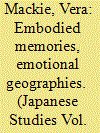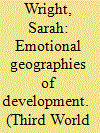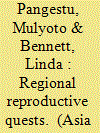| Srl | Item |
| 1 |
ID:
108787


|
|
|
|
|
| Publication |
2011.
|
| Summary/Abstract |
In this article I carry out a close reading of Nakamoto Takako's book, My Diary of the Anpo Struggle (1963). Nakamoto was a writer and activist who was active in leftwing politics, the labour movement and the proletarian literature movement in the 1920s and 1930s and returned to the movement after 1945. Her published diary recounts her participation in the struggle against the renewal of the US-Japan Security Treaty and her other political activities. The book is a mixture of personal memory and political history and provides us with a distinctive 'map' of one person's emotional geography of Tokyo.
|
|
|
|
|
|
|
|
|
|
|
|
|
|
|
|
| 2 |
ID:
123517


|
|
|
|
|
| Publication |
2012.
|
| Summary/Abstract |
Hope, despair, fear, hate, joy, desire and anger; the social scienceshave increasingly recognised the role of emotions in shaping society, and in defining and transforming people and place. Such concerns have clear implications for the study of development. Emotions help create development subjects and define subjectivities. They are imbricated in the production of exclusions and colonialisms yet they can also empower resistance and progressive change. In short, they are intimately bound up with the way development functions in all its messiness. In this paper I begin to explore the generative role of emotions in the discourses and practices of development. I draw on empirical work with land reform participants in the Philippines to consider the ways emotions are central to participants' experiences. Emotions inform how the land tillers act and react, and how they understand the past, present and future. I find that consideration of emotions, and indeed of all that is beyond-the-rational, is imperative if we are to move beyond development's modernist roots towards more postcolonial understandings.
|
|
|
|
|
|
|
|
|
|
|
|
|
|
|
|
| 3 |
ID:
154522


|
|
|
|
|
| Summary/Abstract |
Infertility is a significant reproductive health problem effecting at least 15% of heterosexual Indonesian couples during their reproductive lives. This article explores the preferences and decision-making processes of 15 married infertile Indonesian couples, of high socioeconomic status, regarding intra-regional reproductive travel in Southeast Asia. We consider the reproductive destinations of Singapore, Malaysia and Thailand, revealing their distinct attractions for different couples. We identify a variety of push and pull factors influencing the choice to leave Indonesia to pursue assisted reproduction technologies (ART), as well as the factors shaping the choice of travel destination. One intractable push factor motivating couples to leave Indonesia is the strict regulation of ART, which designates gamete donation and surrogacy as illegal. The paramount concern of our informants was to maximise their chances of reproductive success, and perceptions of higher success rates for conception via ART elsewhere in Asia informed their travel choices. Emotional and psychological concerns were also crucial in determining travel destinations and included a strong desire for privacy; the desire for emotional support whilst attempting conception via ART; the desire for emotional intimacy with one's partner; and the wish for religious compatibility with fertility providers and treatment protocols.
|
|
|
|
|
|
|
|
|
|
|
|
|
|
|
|